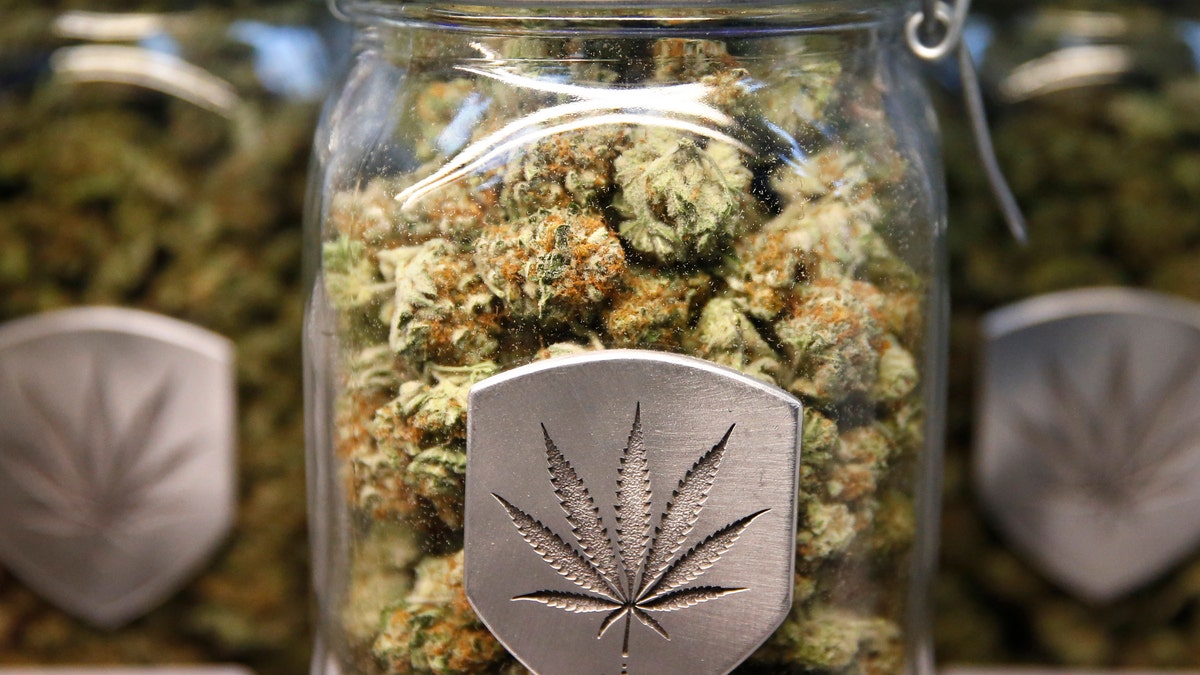
FILE- In this Dec. 27, 2013 file photo, different strains of pot are displayed for sale at a marijuana dispensary in Denver. The state of Colorado released a report Monday, April 18, 2016 detailing changes in everything from pot arrests to tax collections to calls to Poison Control. The most striking statistic wasn't a change at all, but the fact that surveys indicate marijuana use by people under 18 didn't rise significantly in the years after the 2012 vote to legalize recreational pot sales. (AP Photo/Brennan Linsley, file) (AP)
Recreational marijuana won big at the polls on Tuesday, with California, Massachusetts, and Nevada approving those laws and Maine’s measure leaning toward yes, tripling the US population living in pot-friendly states.
The laws allow adults to grow, consume, and give away marijuana — but the patchwork of laws and marijuana’s federal status mean that it can be tricky to stay on the right side of the law.
So if your state has recently given the green light to light up, here are a few things you should know:
1. Cannabis on campus
More From Stat News
Because most colleges get federal money, and pot is still illegal under federal law, universities — private and public — will probably prohibit you from using pot anywhere on campus. Washington State University wrote a very direct post on its website in 2012 when recreational marijuana was legalized for individuals 21 and older. “What will change on campus?” it asks. “Essentially nothing.” University policies there and at other schools prohibiting marijuana remain in place.
Read more: Marijuana and soda taxes win big, but cigarette taxes fail in several state votes
2. Riding shotgun
Driving under the influence is and will remain legal, but if you’re a passenger, it’s a little more complicated. In California, possessing “an open package of marijuana or marijuana products” is a no-no for drivers and passengers alike. But cross eastward into Arizona, and it’s OK to open the package — just not to eat or smoke it. Driver further into Nevada, and whoever is riding shotgun can consume to their heart’s delight, as long as the driver stays clear-headed.
Massachusetts’s law has an oddity — while possessing an open container of marijuana products in motorized vehicles is prohibited in general, it’s OK to have open containers in “the area behind the last upright seat or an area not normally occupied by the driver or passenger.” So if you can manage to cram yourself into the trunk of a minivan, you might be able to reward yourself with a pot brownie.
3. Workplace testing
In all the states who voted yes, you’re free to smoke marijuana at home, but if your employer finds out about it, it can use that as a reason to fire you or deny you a job, since marijuana is still illegal under federal law. This conflict between state and federal laws has led to would-be employees suing their would-be employers who denied them jobs because they use medical marijuana. The new laws do little if anything to help employers navigate the situation — except in Maine.
Maine’s law expressly prohibits employers for penalizing a person “solely for that person’s consuming marijuana outside” of the employer’s property.
4. Lock it down
Make sure to keep your marijuana plants safe. California, Massachusetts, and Nevada specifically suggest using a lock, while Maine just specifies the area must be secured. And keep them out of sight. They shouldn’t be visible to the public view — but it’s OK if people can see them using binoculars or airplanes.
5. Public generosity
Ordinary people aren’t allowed to sell their marijuana harvest. But they can give it away, in small amounts. Just so long as they don’t tweet about it. In Nevada and Massachusetts, the transfer cannot be “advertised or promoted to the public.”
6. Subsidized housing
Since marijuana is still illegal under federal law, people who are applying for federally subsidized housing could be denied if they use marijuana, even if it’s legal in the state. People who already live in federally subsidized public housing could also be evicted. In 2011, the Department of Housing and Urban Development wrote a memo clarifying that public housing authorities aren’t required to evict residents that are consuming marijuana — but they can if they want to.
